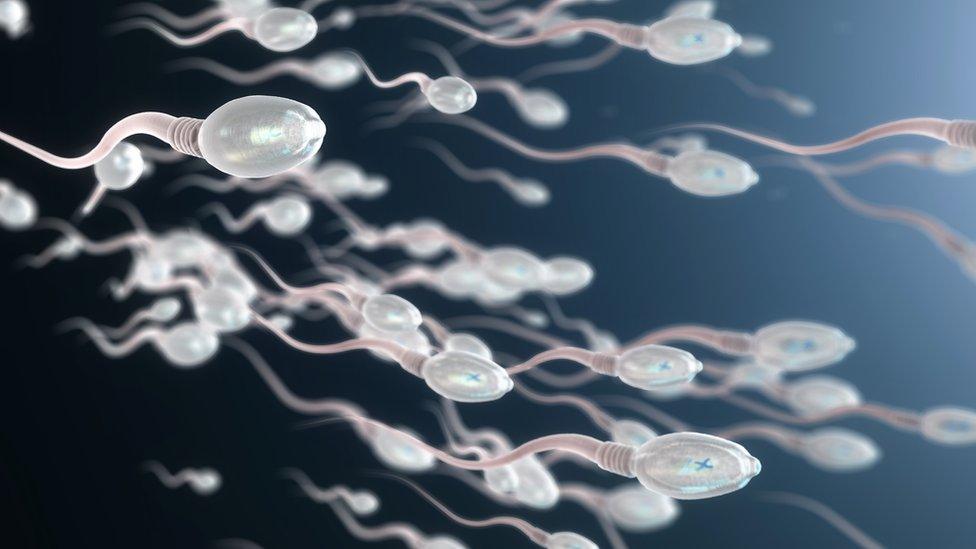Fertility diagnosis left NI man 'broken and grieving'
- Published

Chris was told no sperm had been detected in his sample
"I was in bits, I can't really express to you how bad I was."
When Chris (not his real name) was told by his GP that there was a chance he couldn't have children, the news was devastating.
After five years of trying for a baby with his wife, he had decided to make an appointment for sperm analysis.
That is when he was given the news that no sperm had been detected in his sample.
"It was an absolute bombshell," he told BBC News NI.
"I'd be sitting in bed for days just broken, just crying and devastated."
He added: "It was as if I was grieving."
Such is the stigma felt by some men around fertility issues that Chris did not want to be identified.
"There's a bit of shame to it," he said.
"For every one who's understanding you'll get people who are very cruel about it and it's an incredibly emotional thing to deal with."
'People need to talk about it'
Chris said hearing of his diagnosis left him with many questions.
He said: "There was no advice, there was no telling me what it meant, there was nothing."
He was referred for another analysis, which took six months.
With only his wife to speak to, Chris went in search of other support available for men like him with fertility issues.
What he found was a majority of support groups which focused on women's experiences of fertility, something which he said he could not identify with.
He added: "Men do worry about this stuff, but it's not spoken about that much.
"People need to talk about it."
At the Regional Fertility Centre in Belfast, about 50% of the fertility issues the centre treat are related to men.
The centre provides semen analysis for men in Northern Ireland, alongside NHS labs in Craigavon Area Hospital and Altnagelvin Area Hospital.
It is also the only centre in Northern Ireland that provides the full range of Human Fertilisation and Embryology Authority (HFEA) regulated fertility services.
Infertility is something that effects many men who attend the fertility centre, but many are reluctant to talk about it.

What are the causes of male infertility?
There are many reasons why men can be infertile, external.
The most common cause is poor quality semen, the fluid containing sperm, either because there is a low sperm count, the sperm isn't moving properly or it is abnormal.
Damaged testicles, ejaculation disorders and low levels of testosterone - the male sex hormone - can also cause infertility.
However, some cases of infertility are unexplained in the UK.
Tests to find out the causes of male infertility include semen analysis and a urine test.
More information on how infertility can be treated is available on NHS Choices, external.

'Limited understanding'
Dr Tommy Tang, a specialist in reproductive medicine at the centre, believes that in comparison to women, men have a "limited understanding" of the problems that can impact their fertility.
"We do need to get the message out there that this is not uncommon," he said.
"Fifty per cent of cases are caused by disease or illness, the other 50% are what we call unexplained.
"Lifestyle is also recognised as being a big contributing factor to suboptimum sperm analysis.
"For example, being overweight, having a poor diet, smoking and alcohol consumption."

Treatments like intracytoplasmic sperm injection (ICSI) allows sperm to be injected into the egg
Treatments for men have come a long way in the last 25 years.
Intracytoplasmic sperm injection (ICSI) allows sperm to be injected into the egg, which is used to treat men with low sperm counts.
The process has been described as a "great revolution" in treating male infertility.
Doctors can now also carry out testicular biopsies to retrieve sperm directly from the testicle in cases where a blockage is the cause.
It means that for many men who experience fertility issues there are treatments available that can make conceiving a baby possible.
Dr Deborah Lutton, who is the principal embryologist at the centre, said: "Over the years options have expanded a lot.
"In the past, maybe we couldn't treat or you were looking at using donors."
It is one of these treatments which helped Chris after his diagnosis, but it came with a cost.
After a six-month wait for Chris' second semen analysis, the couple decided to go to a private clinic and pay £3,000 for a testicular biopsy.
The biopsy found a blockage and doctors were able to extract sperm which will allow them to have IVF treatment.
"We were fortunate we had the funds to do it," he said.
"If you don't have access to money I genuinely don't know what people would do. Because the amount of time you're going to wait is just incredible."
The coronavirus pandemic has had an impact on waiting times, with staff at the fertility centre in Belfast working extra hours to address the backlog.
Chris and his wife are now exploring their options, which could include paying for IVF in another country where the cost of treatment can be lower than private treatment in the UK.
Chris said: "The impact this has on mental health is unreal. I've never dealt with it in my life.
"It doesn't just impact on yourself, it can have a huge impact on the people around you too."